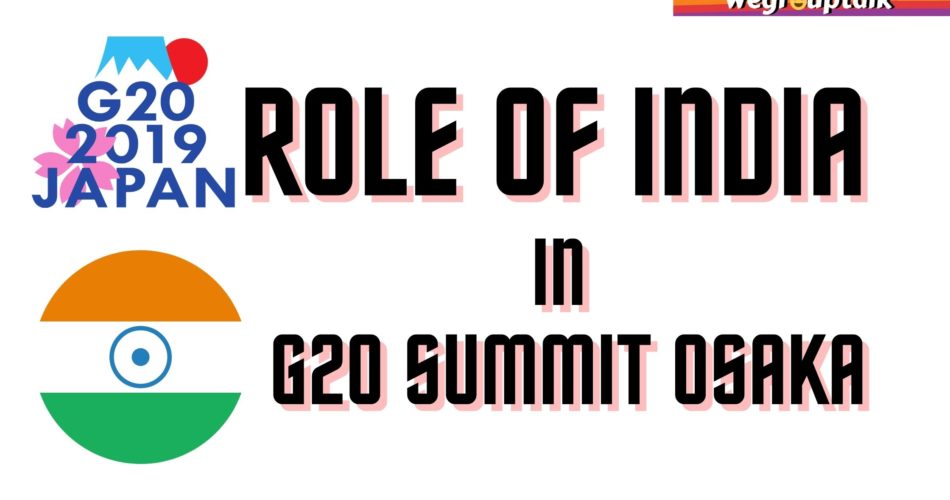What are the G20 Summit organizations tries have come together in this era of globalization and formed corporations or organizations to develop their own country and benefit and profit the other countries of the cooperation or organization? Global issues like climate change, trade tariffs, etc., are also discussed on a worldwide level G20 is one such forum.
Oh, also, hey! The international affair is a beautiful topic to discuss. Knowing more about the global happenings and having an insight into what relation a country indirectly has with another through forums such as G20, EU, NATO, etc. helps you boost your self-esteem and confidence while standing in a group of people. Let’s now see what G20 is and India’s role in the G20 Summit of Osaka.
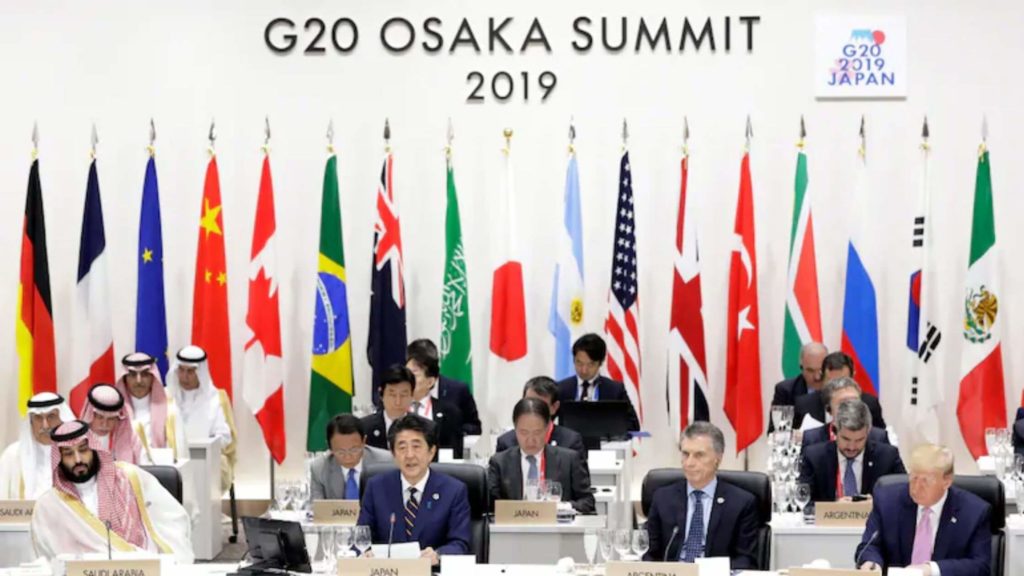
What is the community of G20?
This Community of Twenty or G20 is an international forum of 19 countries and the European Union for governments and central bank governors (EU). Established in 1999 to address policies related to the promotion of international financial stability, the G20 has been widening its agenda since 2008; since then, many world leaders have regularly gathered at summits. It aims to resolve problems that go beyond any person’s obligations.
The G20 membership is made up of 19 different nations, plus the European Union. The EU represents the European Commission and the European Central Bank. Collectively, about 90% of the world’s gross world product (GWP), 80% of world trade (or 75%, except EU intra-trade), two-thirds of the world’s population, and roughly half of the world’s land area make up the G20 economies.
On 25 September 2009, with the G20 rising in stature since its inaugural Summit of leaders in 2008, its leaders declared that the group would replace the G8 as the critical economic council of wealthy nations. Since its inception, some academics have criticized the G20 membership policies, and its summits have been the subject of major protests. Twice in 2009 and twice in 2010, the leaders of the G20 nations held conferences. Since the Summit in Cannes in November 2011, G20 summits have been held annually.
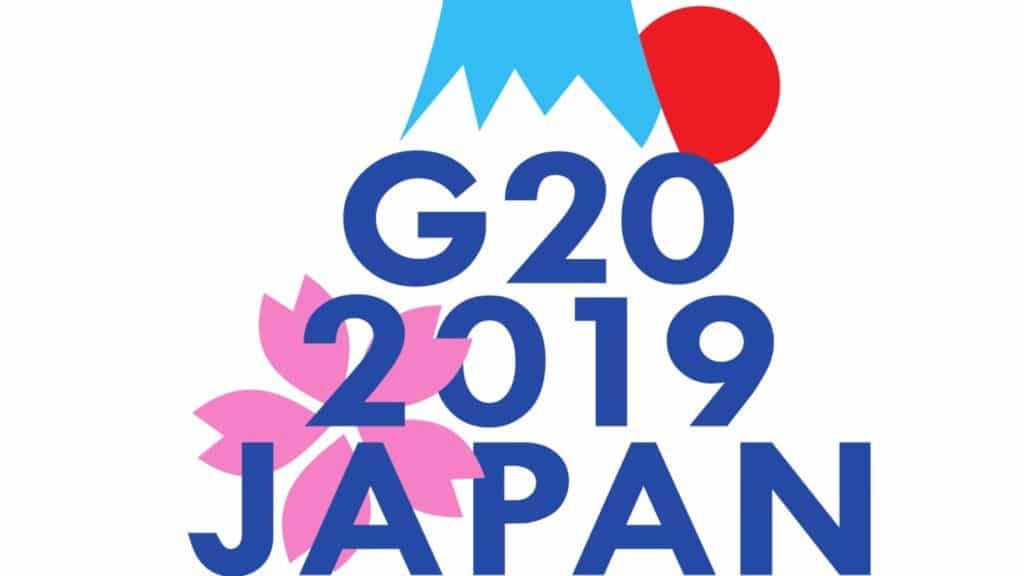
More about the organization?
Without a permanent secretariat or workers, the G20 works. The community’s chair rotates annually between the members and is chosen from a different geographical grouping of countries. The incumbent chair shall create a temporary secretariat that shall coordinate the group’s work and organize its meetings for its duration. Japan, hosted the 2019 summit in Osaka, was the chair for 2019. It is Saudi Arabia who occupies the new chair. It is expected that the 2021 symposium will be held in Italy. Indonesia, India and Brazil will be staging 2022, 2023 and 2024 conferences, respectively.
Proposed Permanent Secretariat
In 2010, France’s President Nicolas Sarkozy suggested creating a permanent secretariat for the G20, similar to that of the United Nations. As potential sites for its headquarters, Seoul and Paris were indicated. Brazil and China supported creating a secretariat, while Italy and Japan expressed opposition to the idea.
List of members
As of 2020, the party consists of 20 members: Argentina, Australia, Brazil, Canada, China, Germany, France, Saudi Arabia, Germany, India, Indonesia, Italy, Japan, Mexico, Russia, South Africa, Turkey, the United Kingdom, South Korea and the United States of America. Spain is an invited permanent guest. Representatives include leaders from 19 countries and the European Union at the Leaders’ Summits, finance ministers and central bank governors from various countries and the European Union at ministerial meetings.
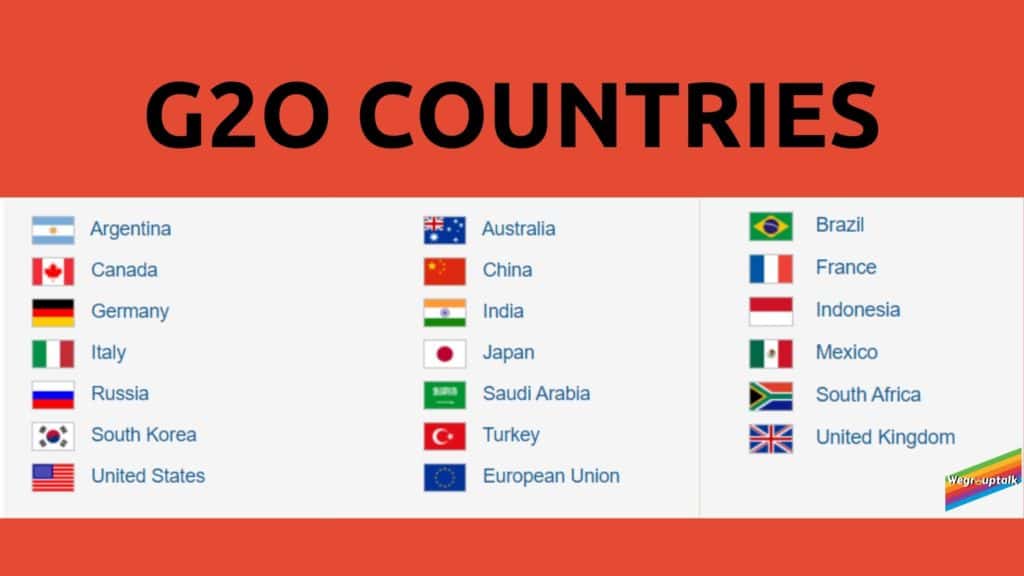
Besides, G20 guests each year include Spain; the president of ASEAN; two African countries (the president of the African Union and the representative of the New Partnership for African Development (NEPAD); and a presidential invited country (sometimes more than one), usually from its own region.
In addition to these 20 participants, G20 meetings are attended by the Chief Executive Officers of numerous other international forums and institutions. These include the MD and Chairman of the IMF, the President of the World Bank, the IMF Committee, and the Committee for Development Assistance.
Agenda of G20
Meeting with Indonesian President Joko Widodo to explore ways of deepening cooperation between India and Indonesia in various sectors. Talks were held with Recep Tayyip Erdogan, President of Turkey, to establish a healthy development relationship between the two countries. To explore ways to broaden collaboration in several sectors, there was a meeting with Scott Morrison; The Prime Minister of Australia.
There were also talks with Crown Prince Mohammed bin Salman of Saudi Arabia to strengthen the bilateral relations between the countries and discuss energy security.
- Financial focus
- As formulated by US, Canadian and German policymakers, the initial G20 agenda was based on the sustainability of sovereign debt and global financial stability in an inclusive format that would be an equal partner for the largest emerging economies. At a November 2008 meeting, the group’s leaders vowed to contribute trillions of dollars to financial institutions worldwide, including the World Bank and the IMF, primarily to rebuild the global financial system. Since its inception, the recurring topics covered by the participants in the G20 Summit have centered on global economic development, international trade, and regulation of the financial markets.
- Inclusive growth
- Inclusive growth is a philosophy that encourages equal opportunities for economic participants with benefits for every segment of society during economic expansion. More’ world issues’ were added to the G20 agenda following the UN Sustainable Development Goals’ adoption and the Paris Climate Agreement in 2015: migration, digitization, housing, healthcare, women’s economic empowerment, and development aid.
- Inter-related themes
- German Federal minister of finance Wolfgang Schäuble insisted on the interconnected nature of issues faced by G20 nations. “Globalization lifted hundreds of millions out of poverty, but there is also a rising frustration in some quarters development, security and migration are all interlinked.”
Now coming on to the G20 SummitSummit Osaka.
G20 summit Osaka
G20 Summit of Osaka held in 2019 which was the 14th session of the G20, a forum of 19 countries and the EU, represented a large chunk of this world’s economy. It was held at the International Exhibition Center in Osaka on 28-29 June 2019. This Summit was the first G20 Summit that was hosted by Japan.
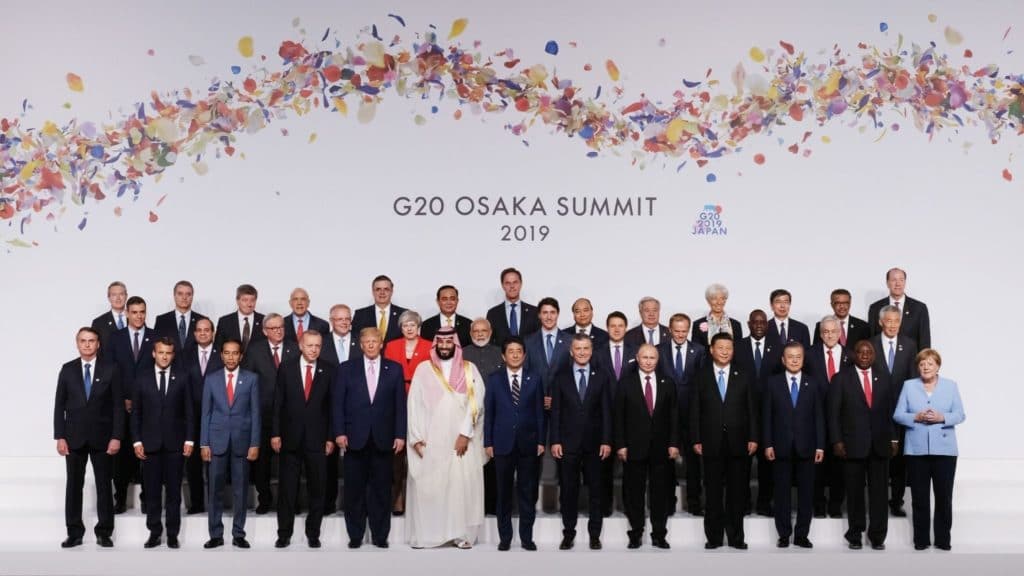
Issues discussed in it
Eight themes to ensure global sustainable development were addressed at the 2019 G20 summit., “Trade and Investment”, “Employment”, “Global Economy” Innovation”,” Women’s Empowerment”, “Development” “Environment and Energy” and “Health” were the eight themes. Regarding trade and investment, support for the necessary reform of the World Trade Organization (WTO) was agreed. Attending the Summit, WHO Director-General Roberto Azevêdo welcomed the communiqué; official communication.
The need for valued and interoperable Data Free Flow with Trust mechanisms, both domestic and international, was addressed concerning innovation. Regarding the latter event, after the event, a press release was released collecting messages from the leaders on their national measures and dedication to women’s empowerment.
A recent piece of news of India’s role in G20 summit Osaka
Shri Narendra Modi, the Honorable Prime Minister, attended the Summit for the sixth time. He reflected the interest of India on the lines of this year’s theme-the human-centred future society.
India emphasized critical issues relating to:
- Trade Reforms, Economic Development & WTO
- The Terrorism
- Protection of energy & Financial Stability
- Artificial Intelligence & Digital Economy
- 5G & Questions about Data Protection
- Changing Atmosphere
- Defense Systems
- Black Money & Corruption
- Economic Fugitives’ Return
- Crisis with Iran
PM Modi has participated in several bi-, tri-, and multilateral talks with various G20 leaders and Heads of State/Government.
India’s role in the SummitSummit:
In a statement for the G20 Osaka Summit, PM Narendra Modi said India’s focus would be on “Women’s empowerment, digitalization and artificial intelligence issues, and progress in achieving SDGs, and our joint efforts to tackle prominent global challenges such as terrorism and climate change are part of the Summit’s rich agenda.” India has made its presence felt at the global level by pushing for a worldwide company. India engaged in numerous talks and meetings on the sidelines of the 2019 G20 Summit, in addition to attending four G20 Summit sessions:
- Bilateral meetings with nine countries’ Heads of State
- The meeting had Productive discussions with Shinzo Abe; The PM of Japan, in which discussions of defense, digital economy, infrastructure, space, and startups were held.
- The talks were much about meeting with President Donald Trump of America. India has iterated its stance on Iran’s situation, trade tariffs, security, and data storage & 5G communication network.
- There was a meeting with President Moon Jae-in of South Korea to explore ways to strengthen the trade-economic and interpersonal ties.
- An interaction with Angela Merkel, the German Chancellor, on diversifying and deepening Indo-German relations in artificial intelligence and cybersecurity was discussed.
- There were 8 meetings with the World Bank, UNSG, Singapore, Singapore, Vietnam, Italy, France, and Chile.
- Two trilateral talks
- Japan- America – India (JAI)
- PM Modi met President Trump and PM Abe.
- Discussions on Indo-Pacific region problems, connectivity and infrastructure growth, peace, and security were held.
- Russia-India-China (RIC)
- PM Modi met with Chinese President Xi and Russian President Putin for an informal RIC summit.
- The three nations addressed the following topics: counter-terrorism promotion, reformed multilateralism, climate change, and international hot-spot issues.
- Japan- America – India (JAI)
- One Multilateral talk with the BRICS nations
- BRICS leaders from Brazil, Russia, India, China, and South Africa met and addressed various global issues and concerns.
- PM Modi talked about the need for protectionism to be battled, for global financial organizations such as the WTO to combat unilateralism, counter-terrorism, and the need to ensure energy security.
- One community event
- PM Modi attended a cultural event and discussed the Indians living in Japan and interacted with them.
Roles India played at the G20 Summit
At the 2019 G20 Osaka Summit, which brings together leaders of nations who contribute to 85% of the world’s GDP, India emerged as a key player. India showed consistency in its agenda and stood on different issues while holding bilateral and plurilateral talks with other nations.
India tried to balance its two friends Russia and America, as it was a common JAI and RIC element. India showed its concern about problems faced by other developed nations. Digital Economy & AI were the topics India was most into and suggested Inclusive, Indigenization, Innovation, Infrastructure Spending, and International Cooperation as the 5 ‘I’s.
India hence projected itself as strong and independent, with able leadership and an accomplished team of diplomats. India is due in 2022 to host the G20 Summit. In preparing India to play the host, the Osaka Summit will play a crucial role. This was all about India’s role in the G20 summit, Osaka.
Follow us on FACEBOOK, INSTAGRAM and TWITTER to stay connected.
ALSO Read- What is Montreal Protocol? Will it improve the situation?

